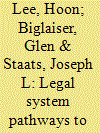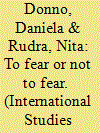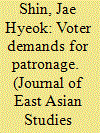|
|
|
Sort Order |
|
|
|
Items / Page
|
|
|
|
|
|
|
| Srl | Item |
| 1 |
ID:
134567


|
|
|
|
|
| Summary/Abstract |
How do we consolidate developing democratic regimes in the Global South so that the life expectancies of these regimes are considerably sustainable? What have been the key epistemological and normative shortcomings of the mainstream scholarship of democratization? How can we overcome these limitations? Is it necessary to consider the global political economy as a fertile source for deducing some explanatory variables that will help us understand the sources of democratic instability at the national-domestic spheres of political governance? In view of these questions, I contend that there are fundamental limitations in the mainstream scholarship on democratization that we have to overcome. In this essay, I critically appraise the nature of the democratization debate by positing that existing material inequities and injustices in new electoral democracies in the developing world are constitutive of global hegemonic interests that function as the critical determinants of democratic stability. Second, I propose some corrective suggestions that will perhaps inspire a new research agenda about democratization that should overcome the limitations of the current mainstream social science scholarship on democratization. Finally, I articulate some concluding substantive remarks on why we need to bring the global political economy back into our scholarly analyses of democratic consolidation.
|
|
|
|
|
|
|
|
|
|
|
|
|
|
|
|
| 2 |
ID:
134565


|
|
|
|
|
| Summary/Abstract |
The development remix, a project initiated at Georgetown University, is a six- to eight-minute-long digital narrative that mixes or edits existing literary or audiovisual representations. The remix project enables development students, scholars, and practitioners to prepare their own narratives about the developing world, through experiencing existing narratives closely, and makes them empathic and critical while humanizing the cultural conditions of poverty in the developing world. The digital remix also actively engages scholars and practitioners with audiovisual representations, rather than as silent observers or readers of fictional texts and visual dramas. After a brief conceptualization on circulation of narratives about the developing world, the article presents the remix technique for the development scholar. The remix is, in effect, a translation with several strengths: it foregrounds the remixer's reflexivity, humanizes the conditions in the developing world, locates voice and agency in development narratives, and presents all narratives as culturally hybrid. These issues have been the subject of not just development research but also social sciences in general, especially on the use of films and fiction in pedagogic practices. Therefore, the usefulness of preparing remixed narratives extends beyond international development studies.
|
|
|
|
|
|
|
|
|
|
|
|
|
|
|
|
| 3 |
ID:
135899


|
|
|
|
|
| Summary/Abstract |
Building on recent works showing the role that legal institutions can play in attracting foreign capital (Jensen 2003, 2006; Li and Resnick 2003; Li 2006; Biglaiser and Staats 2010; Staats and Biglaiser 2012), and drawing on insights obtained from Powell and Rickard (2010), we use panel data for 114 developing countries from 1970 to 2007 to demonstrate that developing countries with common law legal systems attract greater foreign direct investment (FDI) than countries that have civil law or Islamic legal systems because common law systems are more inclined to promote the rule of law and protect property rights and can be understood to provide more efficiency in the law, better contract enforcement, more judicial autonomy, and more market-oriented regulations.
|
|
|
|
|
|
|
|
|
|
|
|
|
|
|
|
| 4 |
ID:
134497


|
|
|
|
|
| Summary/Abstract |
Are the BRICs driving a fundamental transformation of the world economy? Journalists, investors, policymakers, and academics alike prognosticate about the global impact of these large emerging economies. One camp deems the rise of the BRICs a challenge to America's hegemonic power, increasing global politico-economic instability as a result. Another camp defends the continuation of the American (and thereby, global) status quo with equal fervor. The BRICs, they argue, are mired in their own domestic challenges, mistrust one another, have little interest in leading global affairs, and have yet to command true followership by the rest of the developing world.
|
|
|
|
|
|
|
|
|
|
|
|
|
|
|
|
| 5 |
ID:
137209


|
|
|
|
|
| Summary/Abstract |
In this article I seek to explain the microfoundations of patronage politics in the developing world. Two distinct approaches have evolved in the literature. One puts emphasis on the demand side, arguing that patronage persists because poor voters tend to desire individualistic goods over policy. The other focuses on the supply side: few politicians offer programmatic policy, so voters have no alternative but to vote for the politicians who distribute patronage. In this study I test those competing theories using original data from Jakarta, Indonesia. I find evidence supporting the demand-side theory: when both patronage and policy are offered, poor, less-educated voters tend to demand patronage, such as jobs and money, over national programs like free education and universal health care, whereas well-off, better-educated voters tend to prefer the national policies. However, the study also reveals that demands for patronage are affected by level of participation in politics: those who voted in previous elections and those who affiliate with a political party are more likely to demand patronage. This microfoundational evidence helps to explain the persistence of patronage politics in places of widespread poverty.
|
|
|
|
|
|
|
|
|
|
|
|
|
|
|
|
|
|
|
|
|